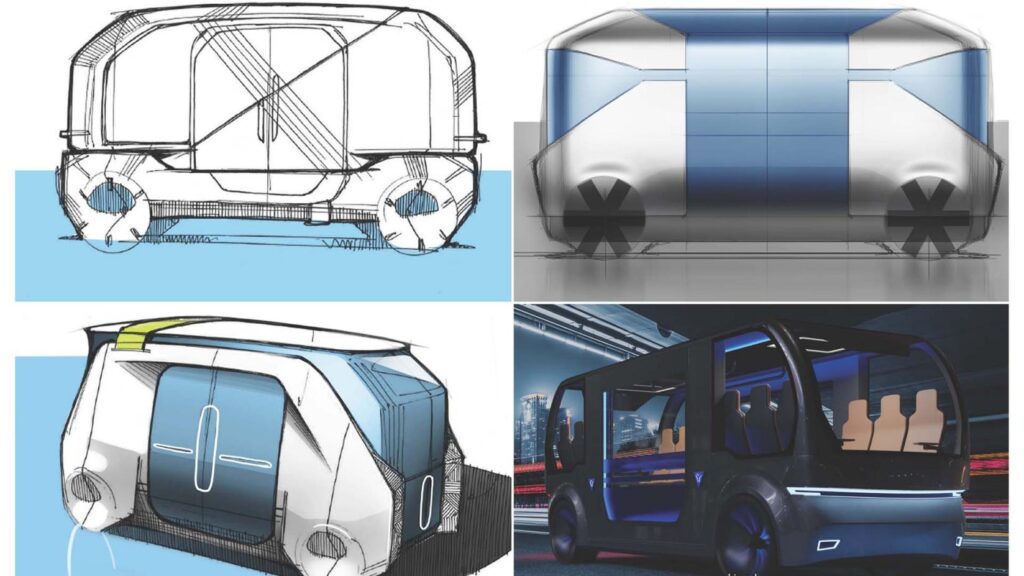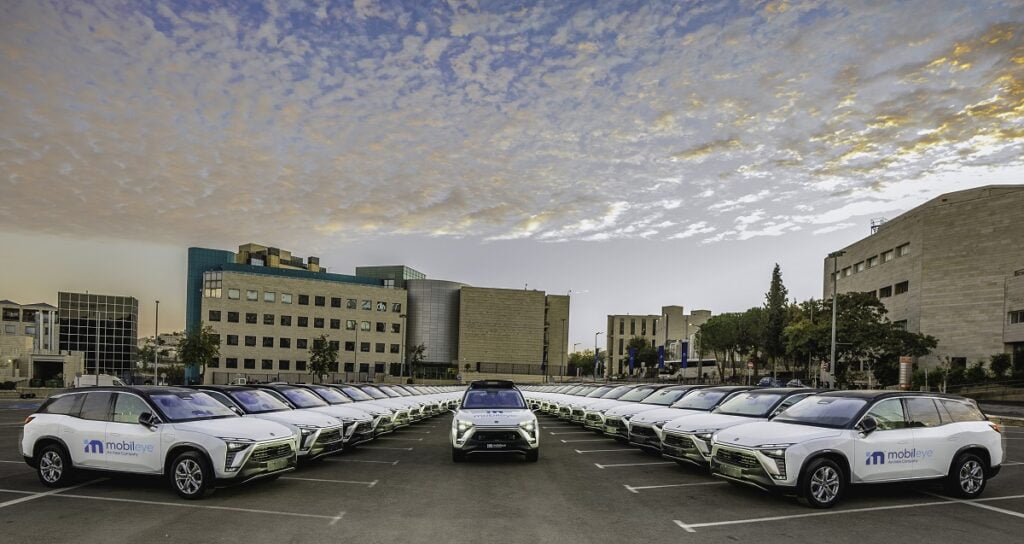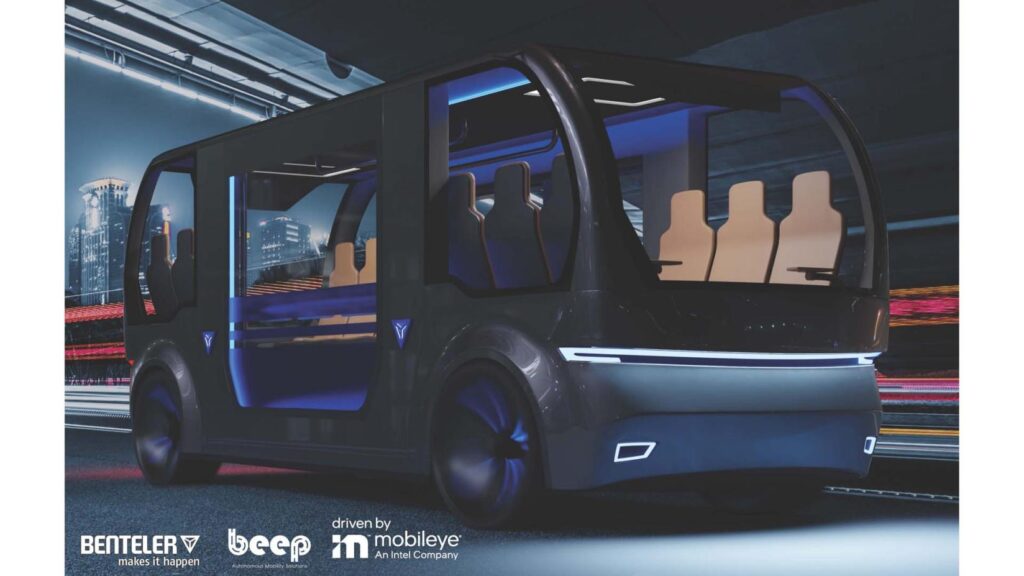Mobileye, the Jerusalem-based developer of driver assistance technologies acquired by Intel Corporation for $15.3 billion in 2017, has joined forces with two mobility firms to develop and deploy autonomous (SAE Level 4) fully electric shuttles in the United States in 2024, the Israeli company announced this month.
The shuttles are aimed at first-and-last-mile use cases in public and private communities across North America, an announcement from Intel said.
Mobileye will team up with German electric mobility unit Benteler EV Systems, and Florida firm Beep Inc., a MaaS (mobility-as-a-service) provider that offers solutions that plan, deploy, and manage advanced autonomous shuttles.
The electric shuttles, which will be powered by Mobileye’s self-driving system Mobileye Drive, will feature 12 to 14 seats and no steering wheel or pedal, according to Reuters. Benteler and Beep will supply the electric shuttles designed to meet automotive industry and safety standards for public road use. The shuttle will be supported by Beep’s proven deployment and operations systems, technology, and services.

They expect to have a couple of hundred of the vehicles on US roads in the first year of their deployment, with a goal to boost the number to between 10,000 and 15,000 globally, Mobileye executives told Reuters.
The project aims to help address ‘micro-transit’ inequities in first and last-mile transportation networks, including road congestion, road safety, and mobility access.
Together, the trio “can address the end-to-end requirements for developing and deploying autonomous vehicles with competencies encompassing scalable vehicle development, end-to-end systems integration, autonomous driving platforms, and turnkey mobility operations management and technology,” the Intel announcement said.
The shuttles will be operated in “contained geo-fenced areas” where speed limits are 35 miles an hour or less, Hinrich Woebcken, advisory board member for Beep and former CEO of Volkswagon North America, said, according to Reuters.
“Multipassenger micro-transit needs are ever-increasing in our cities and towns globally and must be addressed in order to reduce road congestion, protect the environment and provide safe, reliable mobility for all to access,” said Woebcken. “Bringing to market an affordable, automotive-grade, electric, autonomous mover is a solution that will transform mobility as we know it today.”
“The full benefits of autonomy can only be reached with scale. Working with Beep and Benteler, Mobileye aims to mass-produce first- and last-mile self-driving mobility solutions that will enable the convenient, accessible and safe movement of people across North America,” said Johann Jungwirth, vice president of Mobility-as-a-Service at Mobileye.

“Autonomous movers are the solution for future public transportation, solving the mobility challenges of increasing urbanization and emissions,” said Marco Kollmeier, managing director of Benteler EV Systems, a company well-known for its first-class engineering, excellent vehicle integration and global manufacturing expertise in the electric vehicle market,
Sign up for our free weekly newsletter
SubscribeBenteler EV Systems will develop an autonomous mover and integrate all individual subsystems into the final vehicle. This includes the industrialization and production of the mover. Production will take place in the US with the ambition to roll out the mover to other countries helping deliver the mobility of the future, according to the announcement.
For its part, Beep has successfully tested autonomous electric shuttles in many public road projects for tens of thousands of riders over tens of thousands of road miles in 2021 alone. The company’s service and technology are estimated to have prevented many cubic tons of carbon emissions by replacing fossil fuel-based transit services with cleaner electric vehicles. Beep has worked closely with the National Highway Traffic Safety Administration as part of its autonomous vehicle test programs and is applying those years of learning to assist in the design of the new platform with an emphasis on safety.
“Beep’s well-established U.S. footprint for our autonomous mobility operations model, which incorporates machine learning, contextual route intelligence and Beep’s existing centralized command center platform, combine with Benteler’s and Mobileye’s manufacturing expertise to make this the first alignment of all capabilities needed to successfully scale the deployment of this important transformation in passenger mobility,” said Joe Moye, CEO of Beep.
Piloting self-driving projects across the world
Mobileye, a leader in self-driving solutions, has shipped more than 100 million of its computer vision solutions for the established driving-assistance market.
With one of the most widely dispersed autonomous fleets in the world, operating in Israel, Germany, Japan, China, France, and the US Mobileye is proving the capabilities of its Mobileye Drive self-driving system.
More specifically, the Jerusalem-based firm has added Paris to the list of cities around the world where it is conducting ongoing pilots for its self-driving technology. Those cities include New York City, Detroit, Tokyo, Jerusalem, Tel Aviv, and Munich, where Mobileye will launch autonomous “robotaxis” this year.
Riders who participate in the pilot will be able to ride in a Mobileye AV (autonomous vehicle) by using the Moovit smartphone app, which was developed for a consumer ridesharing service with Mobileye. Israeli smart transit data firm Moovit was acquired by Intel last year for $900 million.
Mobileye first began testing its autonomous vehicles in Munich, Germany in 2020 after obtaining an AV testing permit recommendation. It was the first city in Europe to approve the pilot. Mobileye has an ongoing pilot in Israel to test autonomous vehicles since 2018.
In December, Intel announced it would take Mobileye public in 2022 in a deal that could value the Israeli unit at more than $50 billion. Intel acquired Mobileye in 2017 for a whopping $15.3 billion, Israel’s largest deal ever at the time,
Mobileye was founded in 1999 and went public in 2014 on the New York Stock Exchange (NYSE), before being acquired by Intel. The company has scaled autonomous vehicles (AV) test programs across multiple cities around the world, among other projects, and unveiled its production robotaxi. The company has also secured multiple deals for mobility-as-a-service (MaaS) programs in 2023 and consumer and business-to-business vehicle production designs or its self-driving system in 2024.
Related posts

Editors’ & Readers’ Choice: 10 Favorite NoCamels Articles

Forward Facing: What Does The Future Hold For Israeli High-Tech?

Impact Innovation: Israeli Startups That Could Shape Our Future




Facebook comments